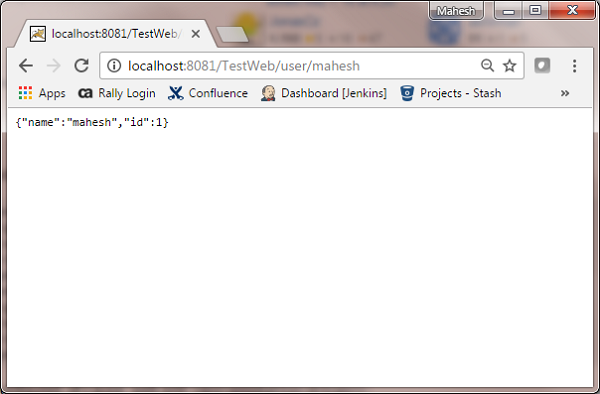SpringMVC-JSONの例を生成する
次の例は、Spring WebMVCフレームワークを使用してJSONを生成する方法を示しています。まず、動作するEclipse IDEを配置し、Spring WebFrameworkを使用して動的フォームベースのWebアプリケーションを開発するための次の手順を検討します。
| ステップ | 説明 |
|---|---|
| 1 | Spring MVC-Hello Worldの章で説明されているように、パッケージcom.tutorialspointの下にTestWebという名前のプロジェクトを作成します。 |
| 2 | com.tutorialspointパッケージの下にJavaクラスUser、UserControllerを作成します。 |
| 3 | JacksonライブラリのJacksonCore、Jackson Databind、JacksonAnnotationsをMavenリポジトリページからダウンロードします。それらをCLASSPATHに入れます。 |
| 4 | 最後のステップは、以下で説明するように、すべてのソースファイルと構成ファイルのコンテンツを作成し、アプリケーションをエクスポートすることです。 |
User.java
package com.tutorialspoint;
public class User {
private String name;
private int id;
public String getName() {
return name;
}
public void setName(String name) {
this.name = name;
}
public int getId() {
return id;
}
public void setId(int id) {
this.id = id;
}
}UserController.java
package com.tutorialspoint;
import org.springframework.stereotype.Controller;
import org.springframework.web.bind.annotation.PathVariable;
import org.springframework.web.bind.annotation.RequestMapping;
import org.springframework.web.bind.annotation.RequestMethod;
import org.springframework.web.bind.annotation.ResponseBody;
@Controller
@RequestMapping("/user")
public class UserController {
@RequestMapping(value="{name}", method = RequestMethod.GET)
public @ResponseBody User getUser(@PathVariable String name) {
User user = new User();
user.setName(name);
user.setId(1);
return user;
}
}TestWeb-servlet.xml
<beans xmlns = http://www.springframework.org/schema/beans"
xmlns:context = http://www.springframework.org/schema/context"
xmlns:xsi = http://www.w3.org/2001/XMLSchema-instance"
xmlns:mvc = http://www.springframework.org/schema/mvc"
xsi:schemaLocation =
http://www.springframework.org/schema/beans
http://www.springframework.org/schema/beans/spring-beans-3.0.xsd
http://www.springframework.org/schema/context
http://www.springframework.org/schema/context/spring-context-3.0.xsd
http://www.springframework.org/schema/mvc
http://www.springframework.org/schema/mvc/spring-mvc-3.0.xsd">
<context:component-scan base-package = com.tutorialspoint" />
<mvc:annotation-driven />
</beans>ここでは、単純なPOJOユーザーを作成し、UserControllerでユーザーを返しました。Springは、クラスパスに存在するRequestMappingとJacksonjarに基づいてJSON変換を自動的に処理します。
ソースファイルと構成ファイルの作成が完了したら、アプリケーションをエクスポートします。アプリケーションを右クリックして、Export → WAR File オプションとあなたの保存 TestWeb.war Tomcatのwebappsフォルダーにあるファイル。
ここで、Tomcatサーバーを起動し、標準のブラウザーを使用してwebappsフォルダーから他のWebページにアクセスできることを確認します。URLを試す–http://localhost:8080/TestWeb/mahesh 次の画面が表示されます。
